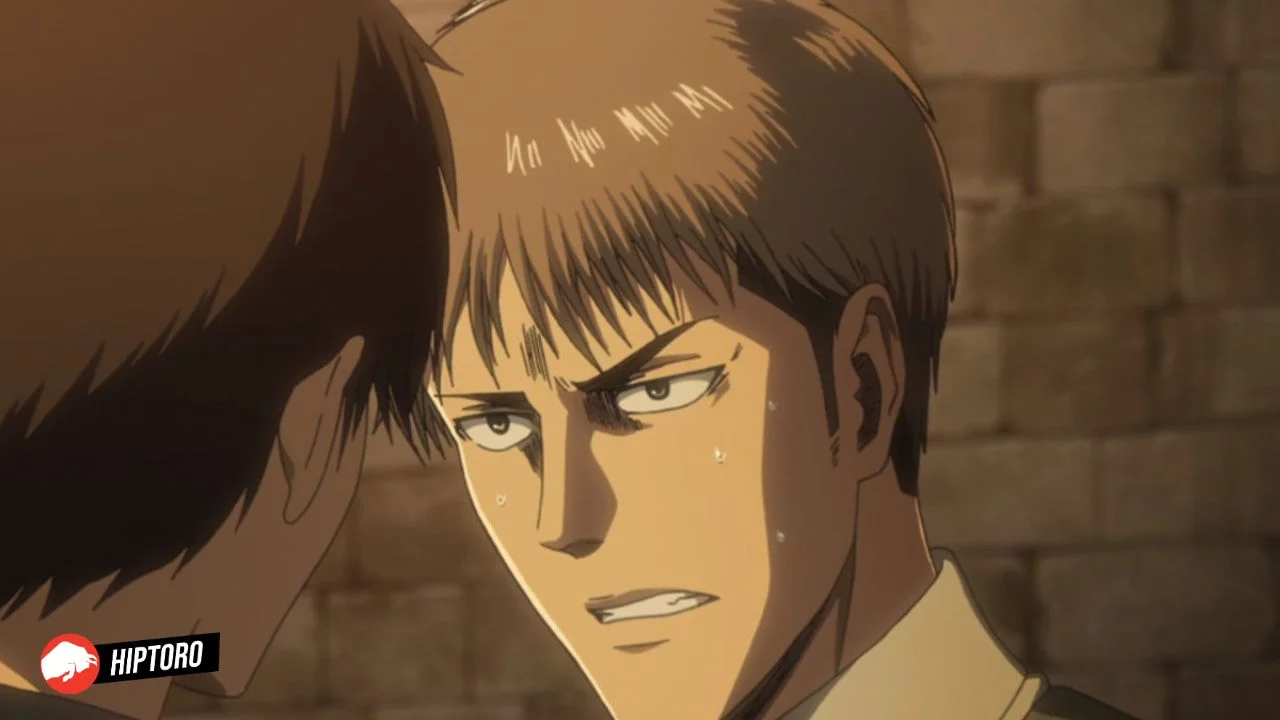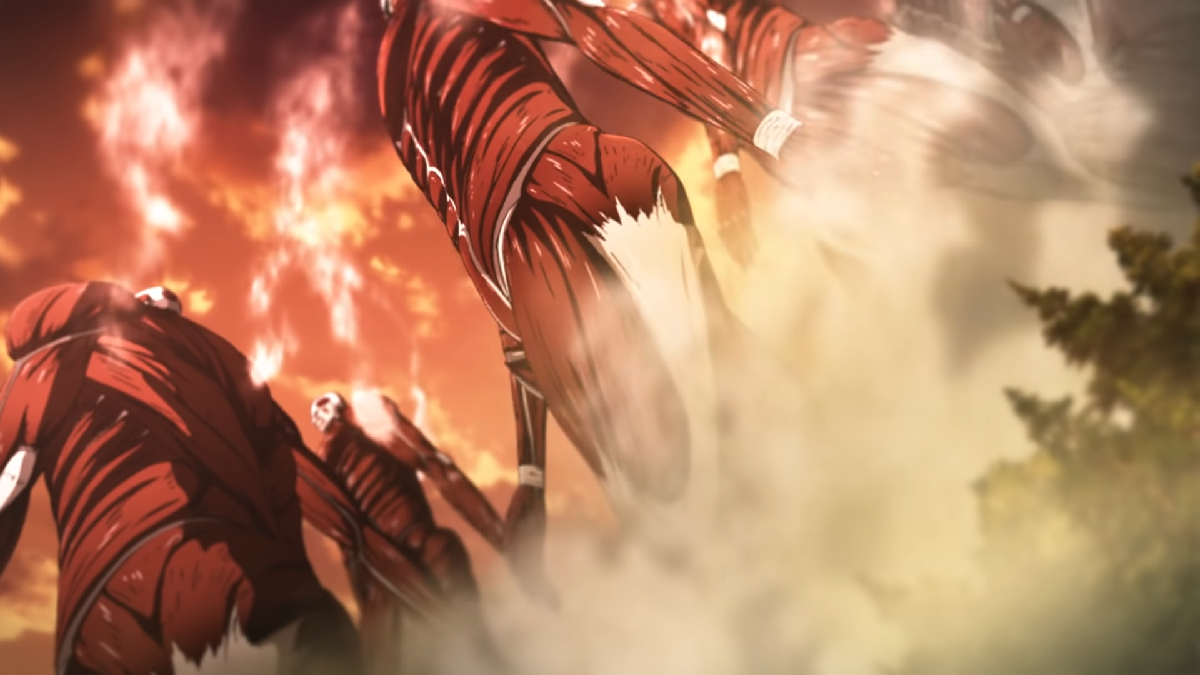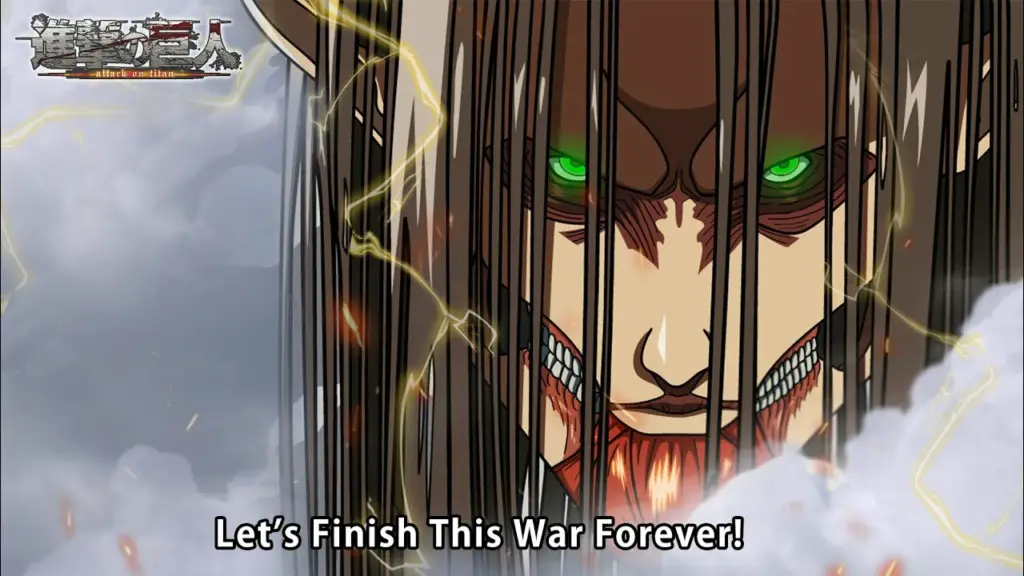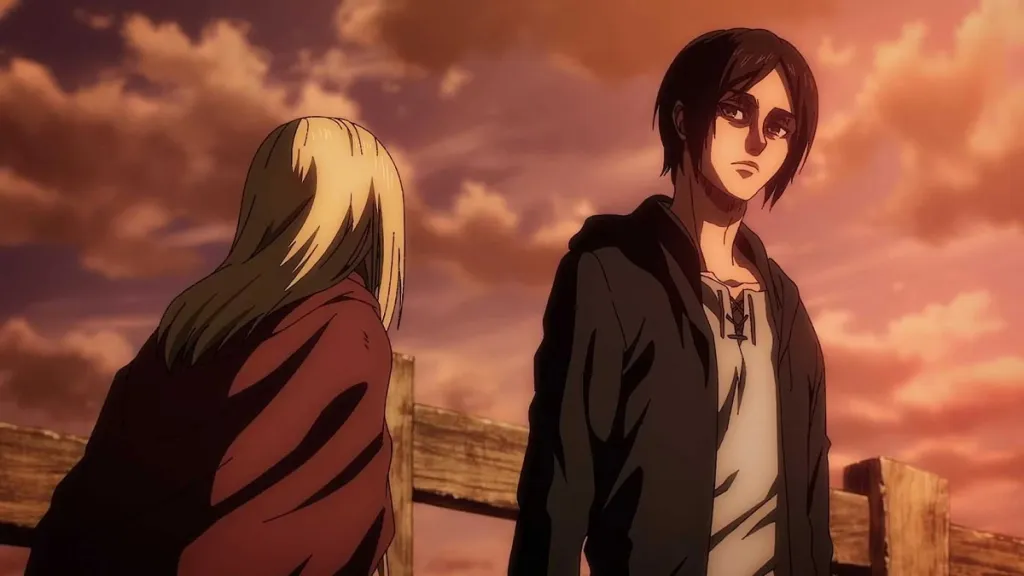In the world of "Attack on Titan," Eren Yeager stands out as a complex character whose evolution captivates audiences. From a passionate kid dreaming of freedom to a determined figure willing to unleash destruction for his beliefs, Eren's journey is anything but straightforward. Understanding his motivations is crucial, especially when he makes the colossal decision to start the Rumbling. Let’s delve into the nuances of his character development and what drives him to take such extreme measures.
Overview of the Rumbling and Its Significance

The Rumbling is not just a plot twist in "Attack on Titan"; it's a powerful culmination of themes like freedom, survival, and the weight of choice. But what exactly is the Rumbling? In a nutshell, it’s the awakening of countless Titans within the walls, creating a devastating force capable of immense destruction. But let’s break this down further and understand its significance.
First, consider the *historical context of the Rumbling within the series. The Titans were once an integral part of the world’s fabric, but their purpose became twisted over time. For Eren, leveraging this ancient power begins as a desperate measure to protect his friends and their home. The Rumbling symbolizes both liberation and annihilation—a duality that mirrors Eren's internal conflict.
To better understand the significance of the Rumbling, let's list its key implications:
- Survival vs. Freedom: Eren believes that to secure freedom for his people, he must annihilate those he sees as threats.
- The Cycle of Hatred: The Rumbling showcases the cyclical nature of conflict. By choosing to destroy his enemies, Eren risks perpetuating the very cycle he despises.
- Friendship and Isolation: Eren's decision isolates him from former allies, highlighting the tragic cost of his chosen path.
- Moral Ambiguity: The Rumbling forces viewers to question morality—can genocidal actions ever be justified, even for a noble cause?
The Rumbling represents Eren's ultimate gamble—trading the lives of millions for the hope of freedom for his friends. It showcases his transformation from the hopeful boy who wanted to explore the world to a hardened leader willing to eliminate anyone in his way.This juxtaposition of freedom and destruction becomes a central theme in the later parts of the series. The ramifications of the Rumbling extend beyond just Eren and his immediate circle; it instigates a global crisis, prompting intense reactions from characters who previously held different beliefs. Through these events, Eren's decision becomes a catalyst for complex, dramatic interactions and moral quandaries that engage the audience on multiple levels.
Ultimately, the Rumbling isn't simply about Eren's choices; it's a reflection of the themes inherent in "Attack on Titan."* It paints a vivid picture of sacrifice, the cost of freedom, and the repercussions of our actions. The series challenges us to confront uncomfortable truths about human nature, society, and what we are willing to sacrifice for the greater good.
Also Read This: How to Friend People on My Hero Ultra Rumble? Networking with Other Players
3. The Events Leading Up to Eren's Decision

The journey leading to Eren Yeager’s fateful decision to initiate the Rumbling is a complex tapestry woven with intense battles, personal revelations, and unimaginable losses. It all starts with the world of Paradis Island and the harsh reality faced by its inhabitants. For years, Eren and his friends grappled with what it meant to be a Marleyan and an Eldian.
Events began to escalate during the Marley arc, where Eren and the rest of the Survey Corps infiltrated Marley. This mission was not just about reclaiming freedom; it was also a desperate response to the discrimination and cruelty Eldians faced outside Paradis. Eren had already witnessed the destruction caused by Titans, not just as a soldier but also as someone who personally lost friends and family to the Titans. The slaughter of his peers during the raid on Liberio put a stern emphasis on survival over moral quandaries.
Throughout the series, we watch Eren undergo a radical transformation. Initially driven by the desire to protect his friends and seek freedom for his people, his interactions with characters like Zeke Yeager and the stark realities he faced began to shift his perspectives. Zeke’s idea of euthanasia and the increasingly bleak outlook on the future of Eldians planted seeds of doubt in Eren’s mind. Some pivotal moments include:
- The fierce battle against the Warriors, where alliances are tested.
- The heartbreaking moment when Eren realizes that his ideals might clash with the only life he ever knew.
- The fallout from the destruction of the Founding Titan’s power, which led to confusion among the ranks of the Survey Corps.
By the time we reach the climax of the story, it becomes increasingly clear that Eren feels trapped. The immense pressure from external conflicts—tension with Marley and the persecution of Eldians—only exacerbates his sense of urgency. His final decision to start the Rumbling was less about a desire to destroy the world and more about needing to take drastic action to ensure the survival of his people.
It’s this build-up of chaotic events, emotional struggles, and philosophical dilemmas that leads Eren to make arguably one of the most controversial decisions in the series—one that sees him not just as a hero or a villain, but as a deeply flawed individual caught in a tragic cycle of hatred and violence.
Also Read This: How to Play Rumble Roses and Unlock All Characters
4. Eren's Motivations Behind Initiating the Rumbling

This brings us to examine the motivations behind Eren’s drastic choice to initiate the Rumbling. On the surface, it appears that Eren has gone rogue, embracing destruction to ensure the survival of his race. But peel back the layers, and you’ll find a more nuanced perspective. Eren’s motivations can be broken down into several key themes:
- Survival of the Eldian People: At the core of Eren's plan is the desire to protect his people from total annihilation. Having experienced betrayal and loss, the looming threat of Marley and its allies drives him towards the extreme measure of the Rumbling.
- The Cycle of Hatred: Eren realizes that the conflict between Eldians and Marleyans has persisted for generations. He believes that to break this cycle, he must take radical steps. The Rumbling symbolizes a cleanse; a way to reset the narrative of hatred that has haunted both sides.
- The Power of the Founding Titan: The mind-bending abilities of the Founding Titan present Eren with unparalleled power, yet this power comes with a burden. His deep connection to Zeke introduces him to a broader, tragic purpose for this power—to control destinies beyond his own.
- Isolation and Desperation: Eren's growing isolation, both physically and emotionally, manifests in his decision. The loss of comrades and friendships weighs heavily on him, pushing him towards a solitary path where he believes he alone is responsible for ensuring the future of Eldians.
Ultimately, Eren’s motivations boil down to a heartbreaking and tragic view of freedom and survival. The initiation of the Rumbling is not merely an act of devastation; it’s a manifestation of deep-seated fear and an extreme reaction to a world that offers no easy solutions. In a landscape rife with gray morality, Eren emerges as a quintessential antihero whose choices invite us to debate the nature of freedom, sacrifice, and the paths we choose in desperate times.
Also Read This: How to Delete a Comment on Rumble and Manage Your Interactions
5. The Impact of Eren's Decision on His Friends and Allies

Eren Yeager’s decision to initiate the Rumbling is one of the most pivotal moments in the series, and it undeniably reshapes the dynamics between him and his friends and allies. Once he reveals his intentions, the world as they know it crumbles—quite literally. His determination leads to heart-wrenching consequences that affect the bonds he formed over the years.
Imagine being in Mikasa and Armin's shoes. These characters have been through thick and thin with Eren, facing countless battles together. Yet, when Eren chooses the path of destruction, it forces them into a position where loyalty and morality clash hard. Mikasa, who has always been fiercely protective of Eren, finds herself grappling with the profound implications of his actions. Her love for him is tested against her moral compass; does she stand by someone willing to eliminate millions for a twisted ideology? That internal conflict is palpable throughout the latter part of the series.
- Mikasa's Conflict: Torn between love and moral obligation.
- Armin's Heartache: The boy who dreamed of peace now faces the reality of Eren's destructive vision.
- Reiner and Gabi's Perspective: As victims turned warriors, they view Eren’s decision through a lens of survival and loss.
This transformation does not just impact Eren’s childhood friends. The conflict sparks divisions among the ranks of the Survey Corps and even within the Marleyans. Characters like Levi and Hange must question their loyalty and purpose. Can they still fight for a world that Eren intends to raze? Levi’s struggles are particularly poignant, as he has witnessed the horrors of war and understood the costs all too well. His connection to Eren complicates things further.
Moreover, Eren's choices lead to dire outcomes for those who initially sought to protect him. Allies like Conny and Sasha, who were much more innocent in their aspirations, face the harsh realities of Eren's new path. The weight of responsibility is immense, as they must decide whether to confront their friend or to find another way to stop the chaos that has ensued.
In the end, Eren's decision acts as a catalyst for growth, forcing his allies to confront their values, making difficult choices about friendship, loyalty, and morality. It's an emotional whirlwind that enriches the narrative while simultaneously deepening the characters' arcs.
Also Read This: How to Buy Rumble Stock for Investors
6. Reactions from the Marleyans and Other Nations
The Rumbling, while a significant turning point for Eren and his allies, also sends shockwaves throughout the realm of Marley and beyond. The immediate response to this cataclysmic event highlights the fear and chaos that lingers in the hearts of those who have historically been enemies of the Eldians. The paradox of Eren's actions is that he becomes both a hero and a villain, depending on the lens through which one views him.
In Marley, the initial reaction is one of terror and disbelief. Marleyans, who have long considered Eldians as enemies, suddenly find themselves facing a force of nature that they cannot comprehend. The colossal titans marching across the land are not just symbols of impending doom; they represent the culmination of years of oppression, war, and dehumanization of entire nations.
- Fear Among Marleyans: Panic spreads as they witness the wrath of the Rumbling.
- The Military's Response: Marley's military leaders frantically strategize to combat the titans, underscoring their desperation.
- International Reactions: Other nations watch with bated breath, weighing the potential consequences of an Eldian resurgence.
Interestingly, Eren's actions also spark discussions among the world leaders about the ethics of warfare and the cyclical nature of hatred. Many nations that have historically oppressed Eldians begin to reconsider their stance, facing the reality that they too could be obliterated by Eren's will. This conflict forces nations to reevaluate their alliances and their moral standings, as they ponder the question of sacrifice for peace versus continued violence.
With protests erupting across countries, the people begin to voice their opinions. Some sympathize with Eren's plight, seeing him as a tragic figure, while others view him as the ultimate monster. This dichotomy reflects the series' exploration of the complexities of war and the murky waters of morality.
The Rumbling creates a pressing dilemma for everyone: How do you combat a force that is both a product of your historical enmity and a threat to your very existence? The multilayered responses from Marley and other nations illustrate a broad spectrum of fear, sympathy, and desperation in the face of an event larger than any one nation or individual. Eren’s decision does not only fracture friendships; it also redefines entire nations’ views on each other, highlighting the intricate web of hatred, fear, and, perhaps, an opportunity for understanding.
Also Read This: How to Get an Aura in My Hero Ultra Rumble and Enhance Your Gameplay
7. The Consequences of the Rumbling on the World
The Rumbling is not just a pivotal plot device in Attack on Titan; it represents a dramatic shift in the balance of power both within and outside the walls of Paradis. When Eren Yeager decided to unleash this catastrophic force, he set off a chain reaction that would have far-reaching consequences for humanity as a whole. Let's dive into some of the major impacts.
Firstly, the most immediate consequence was the sheer destruction of life. The Rumbling involved colossal Titans trampling over cities and civilizations that had existed for centuries. Entire populations were wiped out, and cultures were erased in the blink of an eye. This destruction was not a mere backdrop; it was a central theme illustrating the weight of Eren's decision.
Secondly, the Rumbling led to a significant geopolitical shift. With most of humanity outside Paradis decimated, the balance of power changed dramatically. The rise of Titans as an unstoppable force altered the perception of Marley and other nations. Here are a few key points to consider:
- Collapse of Alliances: Nations that once relied on cooperation for survival found themselves isolated. The threat of Titans created an atmosphere of fear and uncertainty, making alliances fragile.
- Shift in Focus: Countries that previously focused on mutual enmities now had a common enemy. Some nations, rather than becoming defensive, might have sought to harness Titan abilities, leading to further conflicts and ethical dilemmas.
- Echo of War: The devastation sparked by the Rumbling would likely breed further conflicts as survivors sought revenge, occupied territories, or fought over resources.
Moreover, the psychological impact on survivors must be considered. The grief of losing friends and loved ones, compounded by the sheer horror of the Titans, will leave scars far beyond physical destruction. Trauma becomes a major theme as the story progresses, exploring how human beings cope with such loss and fear.
In conclusion, Eren's decision to start the Rumbling was not merely about survival for the Eldians; it was a dramatic reminder of the cycle of violence that has plagued humanity. The consequences extended far beyond immediate destruction, reshaping social dynamics and leaving deep psychological wounds that future generations would have to confront.
Also Read This: How to Play Rumbling on Piano and Master the Melody
8. Analysis of Eren's Moral Dilemmas and Choices
At the heart of Attack on Titan is Eren Yeager, a character defined by his moral dilemmas and choices. As the series progresses, we are faced with the question: was Eren justified in unleashing the Rumbling? To understand his choices, we must explore the philosophy underpinning them.
Initially, Eren is portrayed as a young man driven by a fierce desire for freedom. However, this desire becomes increasingly complicated as he realizes the extent of humanity's plight. Key moral dilemmas that Eren faces include:
- Ends Justifying the Means: Eren believes that the only way to ensure the survival of his people is through catastrophic action. This leads him to question if mass destruction can be justified if it leads to a greater good.
- Cycle of Hatred: Eren wrestles with the idea that any act of violence perpetuates a cycle. Killing indiscriminately creates a world filled with more hatred and future threats. Is he becoming the very monster he despises?
- Individual vs. Collective Good: Throughout the series, Eren's choices seem to prioritize the survival of Eldians over the lives of billions. Can one person's sacrifice justify the loss of so many others?
Eren’s transformation from a hopeful youth to a figure whose actions mirror the tyrants he once opposed highlights the complexity of morality in dire situations. His narrative showcases how power can corrupt ideals and push individuals toward choices that defy their original motivations.
Ultimately, Eren's moral landscape illustrates a central theme of Attack on Titan: the ambiguity of right and wrong. Are actions justified if they stem from a place of desperation? As fans, we are left to grapple with the tragic beauty of Eren's journey as he navigates these impossible decisions.
Conclusion: Understanding Eren's Complex Choices in Attack on Titan
In the intricate world of Attack on Titan, Eren Yeager's decision to unleash the Rumbling is a culmination of his multifaceted character development and the dire circumstances surrounding him. Eren's choices cannot be viewed in isolation; they must be understood in the context of the following factors:
- Survival Instinct: Eren's primary motivation stems from the instinct to protect his friends and ensure the survival of his people.
- Trauma and Betrayal: The cumulative trauma from witnessing countless losses and betrayals contributes significantly to his dark choices.
- Moral Dilemma: Eren grapples with profound moral questions about freedom, violence, and the meaning of being 'truly free'.
- Destined Path: Influences from his past, the memories of previous Titans, and the concept of fate weigh heavily on his decisions.
Moreover, Eren's choice reflects a broader theme in the series: the cycle of hatred and violence. His actions, while extreme and often viewed as villainous, are also a desperate attempt to break the cycle of oppression that has plagued both Marley and Eldia.
Ultimately, understanding Eren's decision to start the Rumbling requires delving deeper into the philosophical themes of freedom, desperation, and the cost of achieving peace. His journey is a tragic reflection of how far one might go when pushed to the brink, making his character one of the most complex and relatable figures in anime history.
 admin
admin








